A trio of French faux-mageurs is proving that great cheese can be made sans dairy
Some estimates place the number of types of cheese in France at around 400; others say that it’s closer to 1,000. Either way, these days the count is expanding in an interesting way, as a fresh breed of fromageurs (cheesemakers) has entered the French culinary scene: the faux-mageurs, who produce delicious Camemberts, bleus, and Munsters without any milk whatsoever.
Vegan cheese isn’t new, of course. Soy versions have been on U.S. grocery shelves since the 1970s. In France, however, where cheese is an art form and a yellow square wrapped in cellophane is a travesty, makers and consumers have been slow to join the fray—this despite the fact that the world’s first known vegan fromageur, Li Yu-ying, started a “soy dairy” in France in 1910. Quality isn’t the only thing holding this revolution back; only 0.3 percent of French people identify as vegan, versus 3 percent in the U.S. But now, with interest in plant-based eating growing in the country, great vegan cheeses are making an entrance.
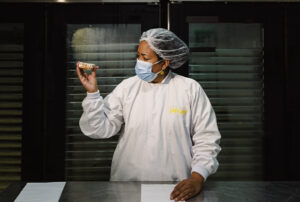
Jay&Joy opened the first French faux-magerie in 2016, paving the way for other artisans. When I arrive at the creamery in Lacroix-Saint-Ouen, about 45 miles northeast of Paris, fog is rising from the surrounding fields, but there are no cows in sight. The place is ultra-modern and spotless, devoid of the animal smells prevailing at typical French fromageries. Before entering the facility, I’m required to don a lab coat and a hair net and swap my shoes for rubber boots. Mary Carmen Iriarte Jähnke, Jay&Joy’s founder, tells me that stringent hygiene is vital to ensure the friendly cheese microbes stay where they’re supposed to be.
A native of Venezuela, Iriarte Jähnke came to France 13 years ago, lured by the outstanding craftsmanship—seen in food, textiles, ceramics, and more—for which the country is renowned. She studied luxury management, then worked for a British fashion designer, but the frantic pace of the work and the industry’s impact on the environment motivated her to reconsider her lifestyle. She quit her job, started meditating, went vegan. That last part of her transformation was hard, though, since she loved cheese. “I suffered,” she says with a laugh. She decided to take things into her own hands and invent plant-based versions of the French cheeses she so enjoyed. She started taking vegan cooking classes and cheesemaking courses and, in 2014, with her husband, Eric Jähnke, a mechanical engineer, decided to launch France’s first vegan creamery.
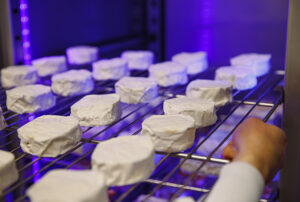
At first, people told her she was crazy. Her response: “In the country of cheese, we need vegan cheese.” Now, seven years later, Jay&Joy produces 20,000 cheeses per week—double its output from just a year ago. The brand has a vegan cheese store in Paris and exports to several European countries, with hopes of making its products available in the U.S. soon. Among those are a Camembert equivalent, a Roquefort-like bleu, and a faux-mage with a washed rind, in the style of northern France’s Maroilles.
Iriarte Jähnke leads me to the creamery’s preparation area, past big bags of cashews waiting to be soaked and ground. From there, we go into the aging area, where the air has a slightly yeasty scent, and where rows upon rows of Camembert-like wheels rest inside state-of-the-art refrigerated cabinets, which strictly control the temperature and humidity. Some of the cheeses are still fresh, while others are maturing, acquiring the white mold of a conven- tional Camembert. This is the Jay&Joy equivalent of an old-school cave d’affinage—“just without the spiders,” Iriarte Jähnke jokes.
My host isn’t in this for the novelty factor; she’s pushing for the highest levels of quality, which is why she continues to hone her technique, taking several classes with master cheesemakers each year. “We need to give the best product ever to the people who are used to the best product ever,” she says. Her dream? To make vegan Pouligny, a pyramid-shaped goats’-milk cheese from central France. “It’s the love of my life,” she says with a smile.
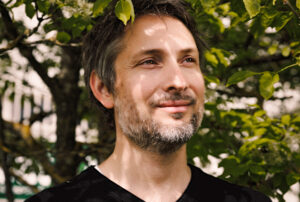
Emmanuel Joubert, the founder of another top French vegan creamery, Tomm’Pousse, doesn’t like to be labeled a vegan, as he still occasionally eats some animal products. “I prefer to say I’m not vegan, but close to being vegan,” he tells me when I meet him at his creamery in Trappes, just a few miles southwest of Versailles. “I still have a freedom to try things. I don’t think you can make good vegan alternatives if you don’t eat cheese.” He adds that he also dislikes the word faux-mage; he argues that the term makes it sound like what he makes is somehow false. He’d like to simply call his products cheese, but that’s not permitted under current French laws, and the dairy industry closely guards its marketing advantage. He notes that even the name of one of his products, CamemVert—a portmanteau of Camembert and vert (French for green)— keeps “getting him into trouble.”
For Joubert, who worked in the pharmaceutical industry before leaving in 2015 to pursue making vegan cheese, the primary goal is to raise awareness. “If you put this product on the table, you know it’s going to start discussions,” he says. What we need to talk about, he believes, is the environmental impact of dairy production. Livestock account for 14.5 percent of all global greenhouse gases—roughly the same amount as emissions from all modes of transportation combined. Joubert would like to chip away at that number, even if just a bit. The Tomm’Pousse website boasts of the environmental benefits of vegan cheese— how it emits less carbon, uses less water, and requires less energy for production. Joubert, however, stops short of being a crusader. “The aim is not for everybody on earth to become vegan,” he says, “but to reduce and diversify, to be aware that there are alternatives.”
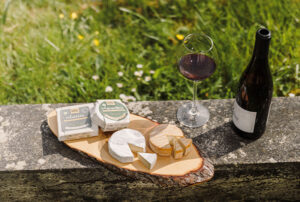
The alternatives Tomm’Pousse makes are appealing. The CamemVert looks and tastes almost identical to a Camembert: rich and creamy, with a soft, velvety crust. Joubert suggests pairing it with wine the way you would a conventional cheese, noting that much like its traditional dairy inspiration, the vegan version goes well with Champagne, because the rind and fat in the cheese cover your taste buds, and the bubbles then rinse them off, exposing your palate to the full array of flavors.
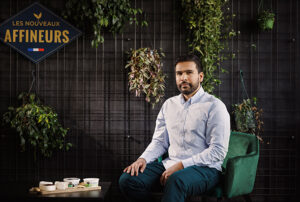
Flavor is something that Nour Akbaraly, the founder of Les Nouveaux Affineurs, approaches methodically. An engineer who studied applied mathematics, Akbaraly tackles cheesemaking like it’s an engineering project, making detailed notes about every step and meticulously improving his process. Before starting his company in 2018, he ran through many home trials, using ferments he purchased off the internet. He met with researchers, microbiologists, dairy producers, and chefs to learn as much as he could about cheese. “I was very frustrated that in France we have such a high level of expertise in cheesemaking, and in the research and R&D behind it,” he says, “yet the only big players working on plant-based products were either North American or from Germany.”
Akbaraly was also disappointed with the quality of most of the vegan cheeses on the market. “Many products, and this is really mainstream, are non-fermented and are very, very highly processed,” he says, explaining that they’re generally full of modified starches, saturated fats (often from coconut oil), preservatives, and texturizers. “We wanted to do some- thing very clean-label,” he tells me as we dig into Les Nouveaux Affineurs cheese at his airy office in the Paris suburb of Ivry-sur-Seine.
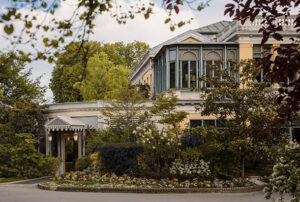
Seeking to do better when he started Les Nouveaux Affineurs, Akbaraly hired a team of food engineers to “dig into the science” behind cheesemaking and to develop healthy, delicious products. Les Nouveaux Affineurs’ formula consists of a mix of cashew nuts and organic French soybeans, which is fermented and aged for as long as six weeks. The process works; his latest product (not yet released) has a creamy inside that evokes nuts and mushrooms, along with a soft, earthy rind. To me, the faux-mage tastes like a high-quality conventional Camembert, and several top French chefs seem to agree: Les Nouveaux Affineurs cheeses are on the menus at Pascal Bastian’s two-Michelin-starred Cheval Blanc Lembach in Alsace and at Yannick Alléno’s three-Michelin-starred Pavillon Ledoyen in Paris, widely considered one of the world’s best restaurants.
Apart from quality, what unites these three faux-mageurs is their conviction that they can make the world a better place one creamy bite at a time, reducing animal suffering and lowering green- house gas emissions, all while keeping consumers healthy, happy, and satisfied. “Going plant-based doesn’t have to be a sacrifice,” Iriarte Jähnke says. “It can be an adventure of new flavors, new textures, new aromas.”
Next Up: Three Perfect Days: Nice




